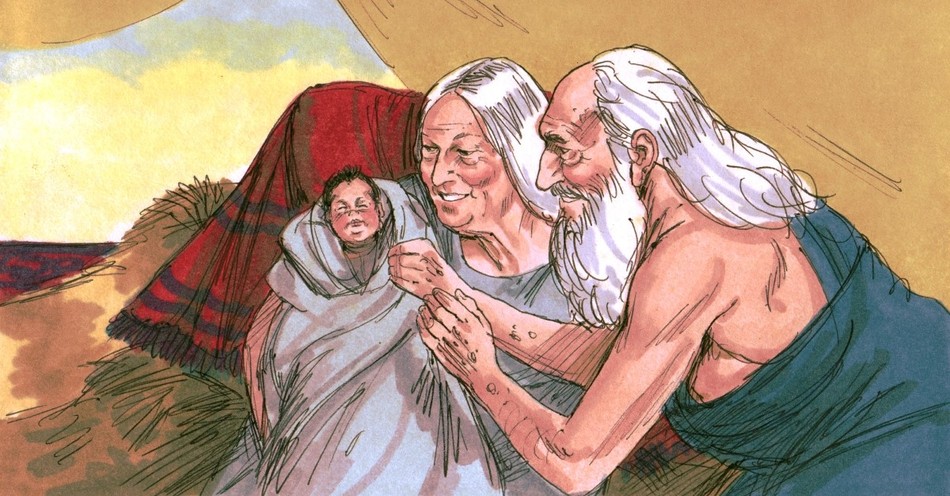Whether you are a long-time student of Scripture or a new follower, it will not take long to discover much of what you read revolves around two Old Testament characters: Abraham and Sarah. In the Bible, we see how Sarah learned through pain and joy that God’s enormous plan reveals itself unexpectedly and with partial glimpses of its whole.
God specifically told Abraham to leave his land and people and go to another, one unknown, which God would show him. In Genesis 12:1-3 God promises to lead Abraham and make a great nation of his descendants. God’s covenant relationship with Abraham, with its ensuing effect on his wife cannot be undervalued.
Like Abraham, Sarah came from the pagan land of Ur. They left their family and home for a place unknown but promised by God. Sarah is the only woman in the Bible whose name God changed. God replaced Sarai, which meant “my princess,” with Sarah, “mother of nations.” God also renamed Abram to Abraham. Abram meant “high father.” Abraham meant “father of a multitude.”
God repeated His unconditional covenant with Abraham, “father of a multitude,” in Genesis 15. However, no child came to Sarah, the mother of nations. God’s promised words spoken to Abraham faded with the pain of infertility. Sarah grew impatient. As the couple aged and years passed without offspring, Abraham and Sarah looked for other ways to fulfill God’s words.
Why Was It Considered Tragic that Sarah Was Barren?
As we seek to understand Sarah’s story in the Bible, we must dig into her day’s culture. Shame and honor were paramount to Ancient Near Eastern societies, and barrenness was considered shameful. It indicated something faulty or incomplete, often resulting in marital strife and divorce.
God commanded His first created beings, Adam and Eve, to be fruitful and multiply. After sin devasted their perfect world, God offered hope that one day, through Eve’s descendants, a Messiah would be born. That expectation helps us appreciate the importance of bearing children in the ancient world.
Even more so as we remember that Sarai came from the pagan land of Ur, where other deities reigned. Infertility wasn’t just a physical problem; it would have been regarded as caused by a spiritual misstep. It signified something had been done to bring disfavor or anger to the gods.
Sarah’s tragedy was also great because producing an heir mattered if Abraham would pass on his wealth and legacy. Children meant a continued family bloodline, a preserved heritage.
Today we see how God’s plan of passing inheritance to the legitimate heir pointed again to Jesus, the Messiah. Ultimately, the tradition foreshadowed God’s plan for our eternal inheritance through salvation in Jesus. We who are his children are also His heirs (Romans 8:17).
Why Did Sarah Suggest Abraham Having Children With Hagar?
“So Sarai said to Abram, ‘See now, the Lord has prevented me from bearing children. Please have relations with my slave woman; perhaps I will obtain children through her.’ And Abram listened to the voice of Sarai.” (Genesis 16:2 NASB)
As a woman in our culture today, it isn’t easy to imagine why Sarah would advise her husband to have a child through another woman. What in the world was she thinking, we ask?
Hagar, an Egyptian, served Sarah as her slave. It seems unreasonable and unwise for Sarah to offer Hagar as a solution to their infertility problem. Nor would we find Abraham’s agreement to such a plan faultless.
Within their society, taking a concubine or another wife was not uncommon. Bearing a child as a surrogate mother for another appears to have been an accepted practice. Ten years had passed since God promised them an heir. The clock ticked, and Abraham and Sarah’s years mounted. Sarah’s desperation to produce the promised son drove her to take measures into her own hands.
Hagar bore Abraham an heir, Ishmael. Her ability to get pregnant proved the infertility issue belonged not to Abraham but to Sarah—this birthed envy, contention, and contempt.
In Genesis 17:19, God promised specifically the child would be born from Sarah, not another.
“. . . Sarah your wife shall bear you a son, and you shall call his name Isaac; I will establish My covenant with him for an everlasting covenant, and with his descendants after him.” (Genesis 17:19 NKJV)
Hagar’s son Ishmael was 14 when Sarah birthed Isaac.
While Sarah’s culture and expectations may have made her actions with Hagar understandable, it was still wrong. Her impatience and lack of belief led to consequences that changed history, impacting nations and peoples today.
The vacillating faith of Abraham and Sarah, seemingly strong one moment and weak the next, shows they were like all of us: imperfect people whom God used. God’s promise of an heir belonged to Sarah and Abraham as a married couple. The union of Abraham and Hagar, although within the norms and fabric of their culture and society, did not meet God’s design.
Paul uses the example of these two women in Galatians 4:24 to describe two covenants, one based on law and the other on grace, one birthed of slavery, and one free.
How Old Was Sarah When Isaac Was Born?
Long past her childbearing years, Sarah birthed Isaac after her ninetieth year. God supernaturally allowed her to conceive long after she physically should have, marking Isaac’s birth with His hand. Sarah had waited over 25 years since God first promised a son, yet God is never late. It happened in God’s set time.
“And Sarah conceived and bore Abraham a son in his old age at the time of which God had spoken to him.” (Genesis 21:2 ESV)
Abraham was 100 years old when his son Isaac was born.
How Many Wives Did Abraham Have After Sarah?
After Sarah died, Keturah became Abraham’s second wife (Genesis 25:1-2). Like Hagar, she is named both as concubine and wife, indicating that perhaps she had first been a concubine and then became his wife. Both Hagar and Keturah had a lesser status than Sarah, as did the children they gave to Abraham.
Although Abraham gave gifts to his other children, it was Isaac, the son promised to Sarah and Abraham, who received the material blessings of the covenant. Abraham eventually sent the other sons away from the promised heir.
What Are Some Things We Can Learn from Sarah’s Life Story?
Sarah’s life story has much to teach us today. Here are seven lessons from Sarah in the Bible.
1. God will do what He has promised. God promised to make a great nation from the offspring of Abraham and Sarah, but it seemed as though Sarah’s infertility posed an impossible obstacle. What Sarah found out is valid for us. God is a God of the impossible. He will do what He promises.
2. God uses imperfect people. Both Abraham and Sarah are listed as great people of faith in Hebrews 11, but their story is neither perfect nor pretty. Still, God used them to accomplish His purposes.
3. God accomplishes His will in His way. Although Sarah tried to help God out with her scheme, God’s plan was not thwarted. He knew what He needed to do and how to do it. Faith today also learns this truth. God is God, and His will does not rely on our manipulations. He will get it done and in the right way.
4. God is faithful. The story of Sarah in the Bible confirmed how God’s faithfulness reigned despite her unfaithfulness. Paul establishes in the New Testament that this remains true for us today, “If we are faithless, He remains faithful; He cannot deny Himself” (Timothy 2:13 NKJV).
5. God desires our obedience. Sarah and Abraham’s lives would have been much different had they obeyed God by trusting His word. We also have choices today. God has given us the Bible so we might know and obey Him through learning and following His instructions.
6. God’s timing is not ours. Waiting requires trust. Sarah’s impatience with each year that passed and her mounting age drew her into a devastating decision and sinful action. The Bible tells us that God’s timing is different than ours. He is never too slow or too fast. He is right on time.
7. God’s Word points to Jesus. “Now we, brethren, as Isaac was, are children of promise.” (Galatians 4:28 NKJV). Sarah and Hagar represent a much broader picture than two women at war with one another. Their lives point to rescue and redemption from the slavery of sin and fulfillment of the promise of eternal life through Jesus Christ.
Sarah’s story teaches us about faith and trust. We recognize through the relationships of Sarah, Abraham, and Hagar that nothing is too hard for God. We see His hand in watching over Hagar, Abraham’s endurance, and Sarah’s submission.
The author of Hebrews refers to Sarah’s faith as a model for us.
“By faith Sarah herself received power to conceive, even when she was past the age, since she considered him faithful who had promised.” (Hebrews 11:11 ESV)
Sarah in the Bible did not follow God perfectly, nor do we. Yet, her example confirms God’s Sovereignty in all situations, even when they may seem completely beyond our control.
Photo Credit: Getty Images/BibleArtLibrary

Her love for pasta and all things Italian stems from years of ministry abroad. She’d love to tell you about it over a steaming cup of cappuccino. Connect with Sylvia on her blog, When the House is Quiet, her Facebook page, or Twitter.
This article is part of our People of Christianity catalog that features the stories, meaning, and significance of well-known people from the Bible and history. Here are some of the most popular articles for knowing important figures in Christianity:
How Did the Apostle Paul Die?
Who are the Nicolaitans in Revelation?
Who Was Deborah in the Bible?
Who Was Moses in the Bible?
King Solomon's Story in the Bible
Who Was Lot's Wife in the Bible?
Who Was Jezebel in the Bible?
Who Was the Prodigal Son?




